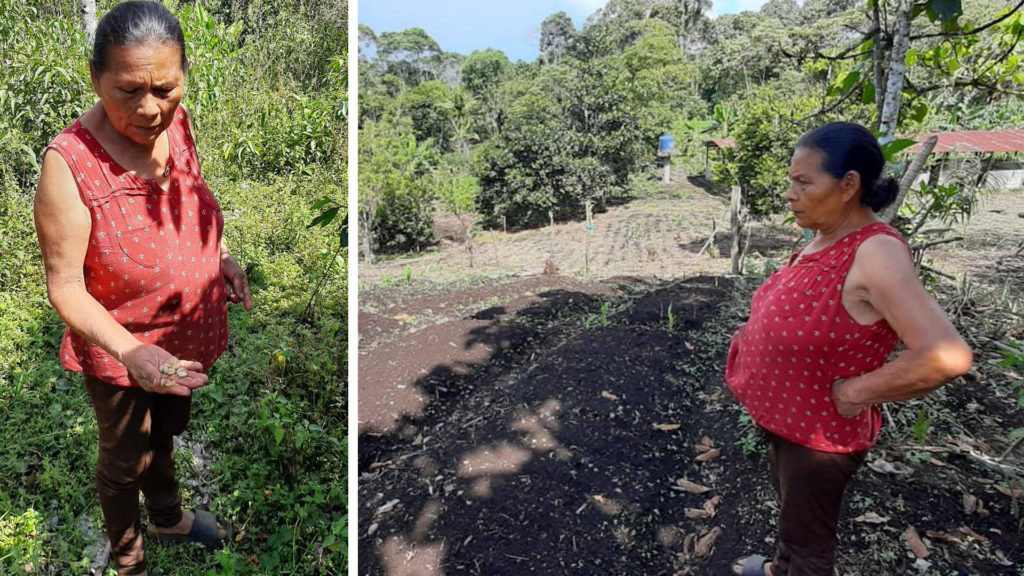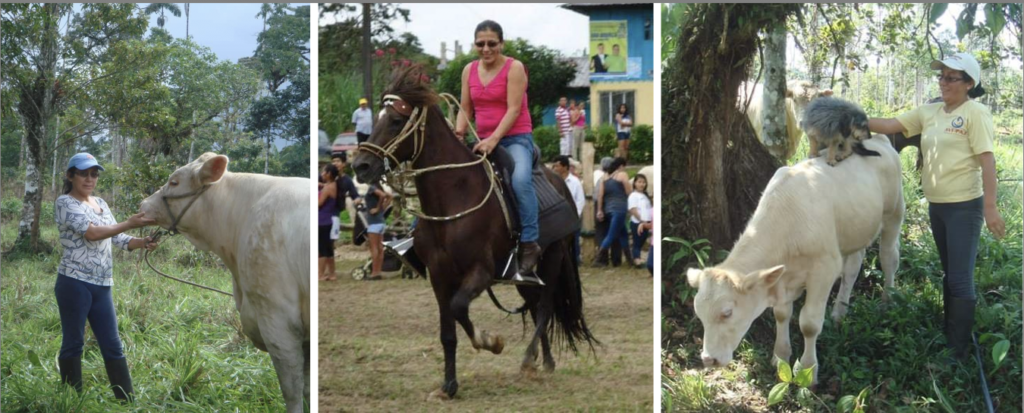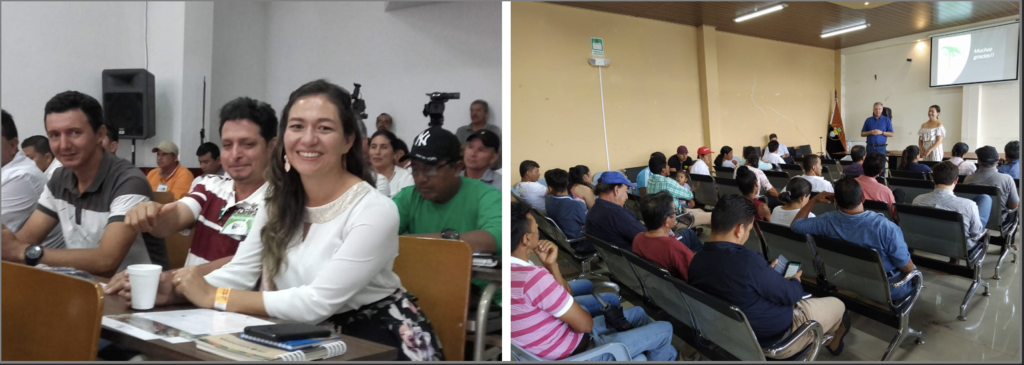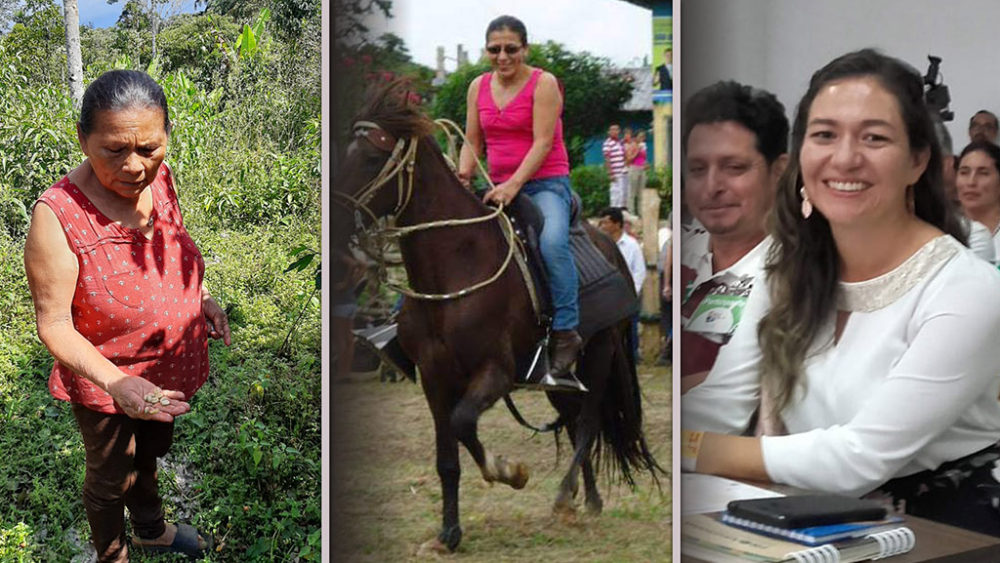Women leaders of the Southern and Northern Amazon are hard-working and proud of taking care of the countryside. They told us about their experience as rural super women and how they care for and conserve forests. What have been their achievements? How do they participate in their communities? Find out in this note.
According to the United Nations, rural women make up a quarter of the world’s population, and work as farmers, wage earners and entrepreneurs. They till the land and plant the seeds that feed entire nations. Moreover, they ensure the food security of their populations and help prepare their communities for climate change. However, despite their good work, there are still gaps that limit women’s participation and rights.
In Chiguaza, Morona Santiago province, Ernestina Chuinda greeted us. She is a 71-year-old leader who raised 14 children and still farms. She went to school in Macas, finished primary school and later qualified as a handicraft teacher.
In a very warm and friendly voice, she told us in her interview that women in her community plant peanuts, yampeen, corn, cassava, sweet potatoes, and coffee.
She also commented: “I have always worked the fields, all my life; we women always plant crops for the family.” She was trained by the Dutch service and the Women’s Political Coordination; she also participated in the Collective Rights Training School of Indigenous Peoples and Nationalities.

Photos: Courtesy of Ernestina Chuinda
Ernestina noted: “Before, women were not allowed to participate in assembly meetings. Only men led the communities and there was no room for us. In 1992, we decided to meet; 210 women were invited and after that we worked until 1998 on empowering women farmers. Today, decisions are made by everyone with the consensus of the family and the association, and the same thing happens in the community.”
According Ministry of Agriculture and Livestock (MAG) data, peasant family agriculture in Ecuador led by rural women accounts for more than 60% of food production through product diversification and crop rotation. Ernestina’s productive activities include a family garden, where she grows vegetables for consumption. She feels it is necessary to maintain her agricultural activities and take care of the environment. She said: “it is important to conserve our forest, not everything can be cut down, we need to provide guidance on reforestation.” One of the advantages and benefits of forest conservation that this leader has recognized is that this ecosystem allows her to have a friendly relationship with the environment, bamboo helps her build her house and chonta contributes to her diet.
In the same province and in the livestock sector, we met Marta Uyaguari in the compilation of stories on women from the Amazon. “I was born in Sinai and I have lived in Macas for 48 years, but my economic activity is in Sinai.” She lives with her husband and raises beef cattle, and also has an agricultural store. She studied in Macas and she has a degree in Business Administration.
According to Marta, her livestock activities began when she was a child; she accompanied her mother to milk the cows, released the calves and watched the cattle. “I learned everything from my parents. I made sure that the animals were healthy. We cured them and gave them medicine. I learned how to Yagura improve pastures and have a better vision of caring for pastures and the environment.”
She also mentioned that “women are prepared to participate in decision-making at any level, in the field or in an administrative or managerial position. I know brave women who get up early to tend the cattle, milk the cows, and then make the cheese. Others are involved with marketing and others serve in institutions.”
Her dreams include: to have pastoral livestock with electric fences and pastures with good vegetation. In other words, to ration the plots, optimize the number of animals per hectare and enhance forage production.

Photos: Courtesy of Marta Uyaguari
On our way to the province of Orellana we met Mary Diebold, 38 years old and married with two daughters. She is from Quito but lives in Coca. Currently, she manages a family farm and provides administrative support to a company in Coca. Besides being a mother and a businesswoman, Mary is a palm sector representative in the Area Office of the National Association of Oil Palm Growers (Ancupa).
Mary is from an agricultural family and her mother taught her the trade. During her working life, she has had to juggle the care of her children with work times of the farm. Her greatest achievement has been promoting fair marketing and supporting the Amazon palm community. A few years ago, she fought to ensure that companies would receive and pay for the fruit harvested in her area. She remembered that “sometimes they would receive the fruit but not pay us for it. We organized ourselves to transport the fruit to the coast and sell it to companies there. That’s how we demanded fair treatment from local companies. I don’t think those bad times will ever happen again.”
In agriculture, the detailed work of women has been important. For example, on farms in her area, women lead, organize and plan their work. In recent years, leadership and responsibility to the environment have become her priority. Mary emphasized: “We also take care of the flora and fauna. The Oriente is a paradise – I have a farm and a botanical garden around my house.” On her farm wetlands are conserved and there is a conservation area of more than 50 ha. Her family has been involved in forest conservation for about 30 years and she hopes that her children will also participate.

Photos: Courtesy of Maria Diebold
PROAmazonía promotes gender and intercultural approaches as strategic tools for counteracting historical and cultural inequalities suffered by women in the Ecuadorian Amazon. With the support of UN Women, we reinforce governance actions, environmental incentives and sustainable practices to reduce deforestation and forest degradation with a gender perspective. The objective is for interventions in the Amazon region to achieve comprehensive participation by women and men.
Achieving gender equality and empowering women helps fulfill the Sustainable Development Goals as well as PROAmazonía goals.
Author: Liz Jurado – PROAmazonía Development Communications Specialist
1 Dutch Service for Development Cooperation. Ecuador (SNV. Ecuador)
 Español
Español English
English

Comments are closed.